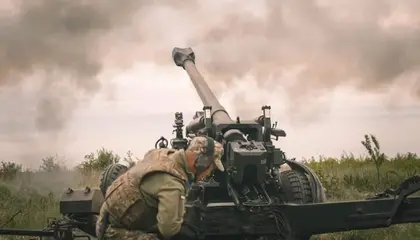It appears that the long awaited offensive to take back Kherson has opened. According to Ukrainian sources, on August 29, the Armed Forces of Ukraine broke through the occupying force’s first line of defense near Kherson.
The first Ukrainian strikes seem to have fallen on positions occupied by the 109th Donets People’s Republic’s 109th militia regiment— puppet forces of the Russian occupation. These DPR forces are reported to have fallen back in disarray. More importantly, an adjacent unit of Russian VDV paratroopers, a first line unit that might have been expected to meet the attack, have apparently also fled the battlefield. Ukraine’s initial successes are likely to continue.
- Check the latest war in ukraine update from the Kyiv Post's news articles released today.
- Read the most current Ukraine news stories for today.
JOIN US ON TELEGRAM
Follow our coverage of the war on the @Kyivpost_official.
Ukrainian planners have prepared the battle space well.
Ukraine has ensured that Russian logistics were badly stressed. Over the past weeks, Ukrainian precision strike artillery has targeted Kherson’s rail and highway bridges, destroying one and badly cratering the other. Intelligence analysts estimate that Russian Ukrainian artillery strikes had reduced supply traffic across the Dnieper by as much as 70%. In the days before the offensive, Russian troops reported running out of food and fresh water.
The interdiction of Kherson’s river crossings has served two purposes: it has strangled Russian logistics and, more critically, it has greatly decreased the maneuver options available to Russian commanders.

Trump Makes 90 Day Foreign Aid Freeze – Ukraine Military Support Supposedly Untouched
The Russian 42nd Combined Arms Army now faces a developing Ukrainian offensive with an uncrossable river at its back. The occupiers of Kherson will have two options: to fight and die in place– or die trying to swim the Dnieper.
Nor is Kherson the only objective. Ukraine has been slowly and meticulously using precision artillery to disable the bridge associated with the hydro-electric dam complex at Nova Kakhovka. It is reported that Russian forces are being attacked on this axis as well. Like their comrades at Kherson, local Russian commanders now face the same grim dilemma: they can fight and die on the north bank– or die trying to swim the Dnieper.
One final problem faces the occupiers of Kherson: partisans. Deeply inserted Ukrainian Special Operations Forces have established Partisan direct action and intelligence networks throughout the city and the surrounding countryside.
Ukrainian partisan networks provide up-to-date targeting data on Russian troop movements and ammunition depots. In the past weeks, Ukrainian artillery has been able to hit bridges just as Russian ammunition convoys are attempting to cross. Partisans will now be passing information on the positions of Russian reinforcements; Ukrainian artillery will make sure they don’t arrive.
Ukraine has been playing a long game in Kherson, preparing the battlefield carefully. Those preparations are now coming to fruition. By throttling Russian logistics, Ukraine has negated much of the combat effectiveness of an otherwise overwhelming force. By destroying bridges over the Dnieper, Ukraine has cut off Russian troops from reinforcement. By blowing the P-47 highway bridge at Daryivka, Ukraine has prevented the Russian garrison at Kherson from communicating with, or reinforcing, the occupiers of Nova Kakhovka. These two forces are divided and are now both vulnerable.
By playing a game of bridges, Ukraine has pinned these units in place. By surrounding the occupiers with Partisans, Ukraine can strike maneuvering Russian targets at will, degrading their effectiveness and ripening them for harvest. The Kherson offensive has been long in coming– but the wait has been worth it.
You can also highlight the text and press Ctrl + Enter










